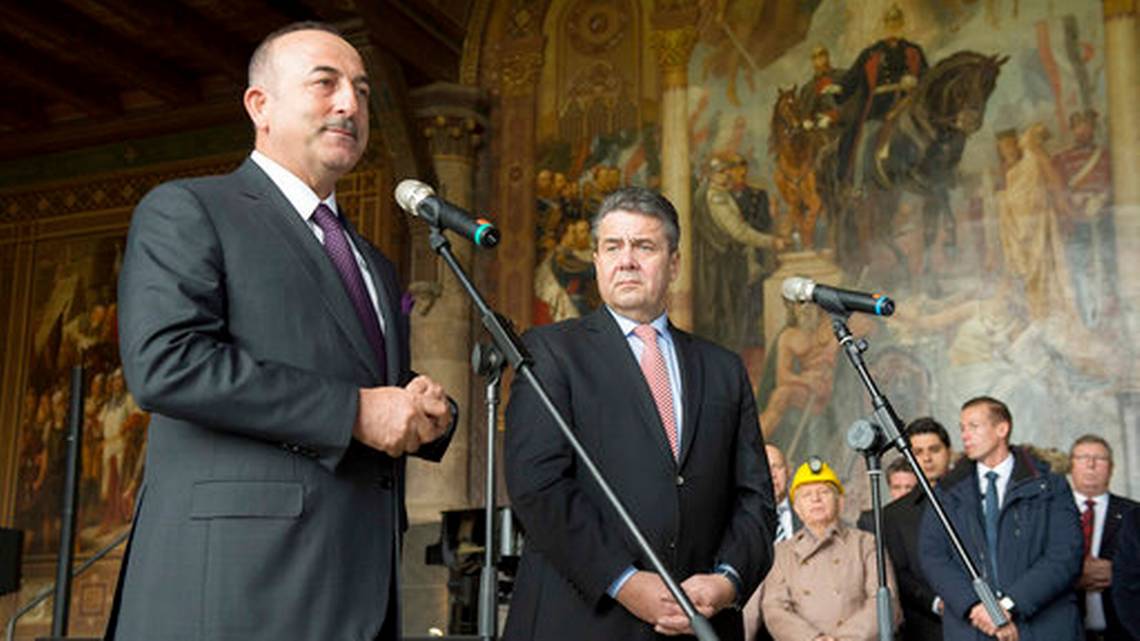German, Turkish FMs Pledge to Work for Mending Strained Ties
Foreign Ministers of Turkey and Germany pledged to spend efforts to mend ties significantly strained by a number of thorny issues that bedeviled a healthy dialogue between the two NATO allies.
German Foreign Minister Sigmar Gabriel and his Turkish counterpart Mevlut Cavusoglu met on Saturday to discuss how to improve bilateral ties.
Relations between the NATO partners have been badly strained in recent years, especially since the failed coup in Turkey and 2016 and a subsequent crackdown which saw tens of thousands of people arrested, including several German or dual citizens.
“We have both given ourselves the task to do everything to overcome the difficulties in German-Turkish relations,” said Mr. Gabriel, who hosted his Turksih counterpart at his home in Goslar.
He said they had “open talks held in mutual respect” although they “certainly did not share the same view on all matters.”
Mr. Cavusoglu, however, warned against Turkey being lectured or threatened, saying: “These are not good methods, according to us.”
He also called for deeper economic ties based on “dialogue, mutual understanding and cooperation.”
Their talks followed a meeting in Paris on Friday between Turkish President Recep Tayyip Erdogan and French counterpart Emmanuel Macron, who warned that there was no chance of Ankara’s EU stalled membership bid moving forward.
Germany, home to a three-million-strong ethnic Turkish community, last year advised investors and holiday-makers to avoid Turkey and urged a cut in EU funding linked to Ankara’s membership talks.
The crisis has been fuelled by other disputes: over a German TV comic harshly lampooning Mr. Erdogan, a 2016 German parliamentary resolution on the Armenian genocide, and Turkey denying military base visits to German MPs.
Ankara has accused Berlin of failing to pursue followers of US-based Islamic preacher Fethullah Gulen, whom it blames for the 2016 coup attempt, and of failing to crack down on Kurdish militants.
When Germany last year repeatedly denied Turkish politicians’ requests to campaign for votes among the Turkish-German community, Ankara accused the government of using “Nazi” methods.
Ankara has in recent weeks sent a flurry of signals that it wants a return to warmer relations with the EU and Germany, at a time of tensions with the United States, Israel, and some Gulf states.
President Erdogan had declared last month that Turkey “must reduce the number of enemies and increase the number of friends.”
The main hurdle in Ankara-Berlin ties is the detention of Die Welt daily’s German-Turkish correspondent Deniz Yucel on terror charges since last February, and of another six Germans Berlin says are jailed for “political reasons”.
Turkey has in recent weeks released several of the Germans whom Gabriel has labeled “hostages”, among them journalist Mesale Tolu.
Hopes grew that Mr. Yucel’s case too could be resolved after the Turkish government this week addressed it for the first time in 10 months with a submission to the constitutional court, which could soon rule on whether to release him from pre-trial detention.
Foreign Minister Cavusoglu stressed the independence of Turkish courts but pledged that “we’re doing everything in our political power to speed up the judicial process.”
Hosting Gabriel recently suggested to news weekly Der Spiegel that Western countries should tone down lecturing Erdogan’s Turkey on democratic values because it could be counterproductive.
Calling for an “enlightened debate” on the issue, Mr. Gabriel said that “to constantly accuse each other of betraying values will neither get someone out of jail nor will it strengthen us.”




Comments are closed.